Be careful in Japan. It can catch you out. My family and I spent a month backpacking around Japan and we learned a lot about the things not to do in Japan (and sometimes those lessons weren’t pretty hence the reason for me sharing this with you!).
You can find lots of information all over the internet about things to do in Japan, but for some reason, travellers tend to keep the things not to do to themselves.
Hmm. Lucky for you, I’m not that kind of traveller.
In fact, I’m the kind of woman who likes to share the good, the bad and the ugly so that when you visit one of the most beautiful places in the world, Japan, you’ll be as prepared as you possibly can.
This post may contain affiliate links. They cost you nothing but we make a small commission. If you would like me to explain it further, please visit our disclaimer page.
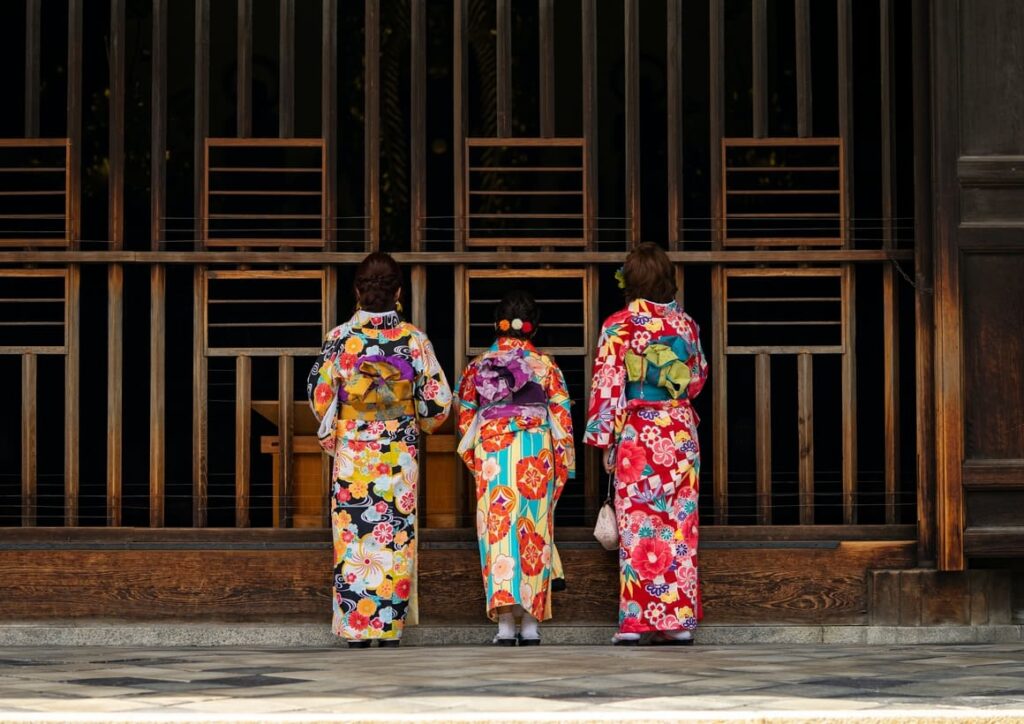
Learn what not to do in Japan and avoid embarrassing whispers!
What Not To Do In Japan? Why is it Important?…
Knowing what not to do in Japan is important because not only do you want your visit to Japan to be as smooth as possible but you want to be as respectful.
This post will help you understand what not to do. Along with that, I suggest that you brush up on some culture facts about Japan before you arrive.
After all. You don’t want to ‘lose face.’ (The Japanese phrase translation for ‘lose face’ is Mentsu wo ushinau!).
Japanese People
The Japanese people are so very polite.
They would hate to think they were being rude or upsetting you by telling you that you weren’t behaving correctly – instead, they will just giggle to themselves and maybe take you quietly to one side.
That’s how life in Japan is. Japanese people do things quietly and politely. But they get their point over.
So, to save you from having to find out yourself about the do’s and don’ts in Japan, I’m sharing with you what I learned when visiting the land of the rising sun with two kids.
Here are 28 things not to do in Japan (so you are not exposed to giggles and whispering). Ready? Let’s go…
Things NOT to Do in Japan (If You Don’t Want to Look Like a Complete Wally).
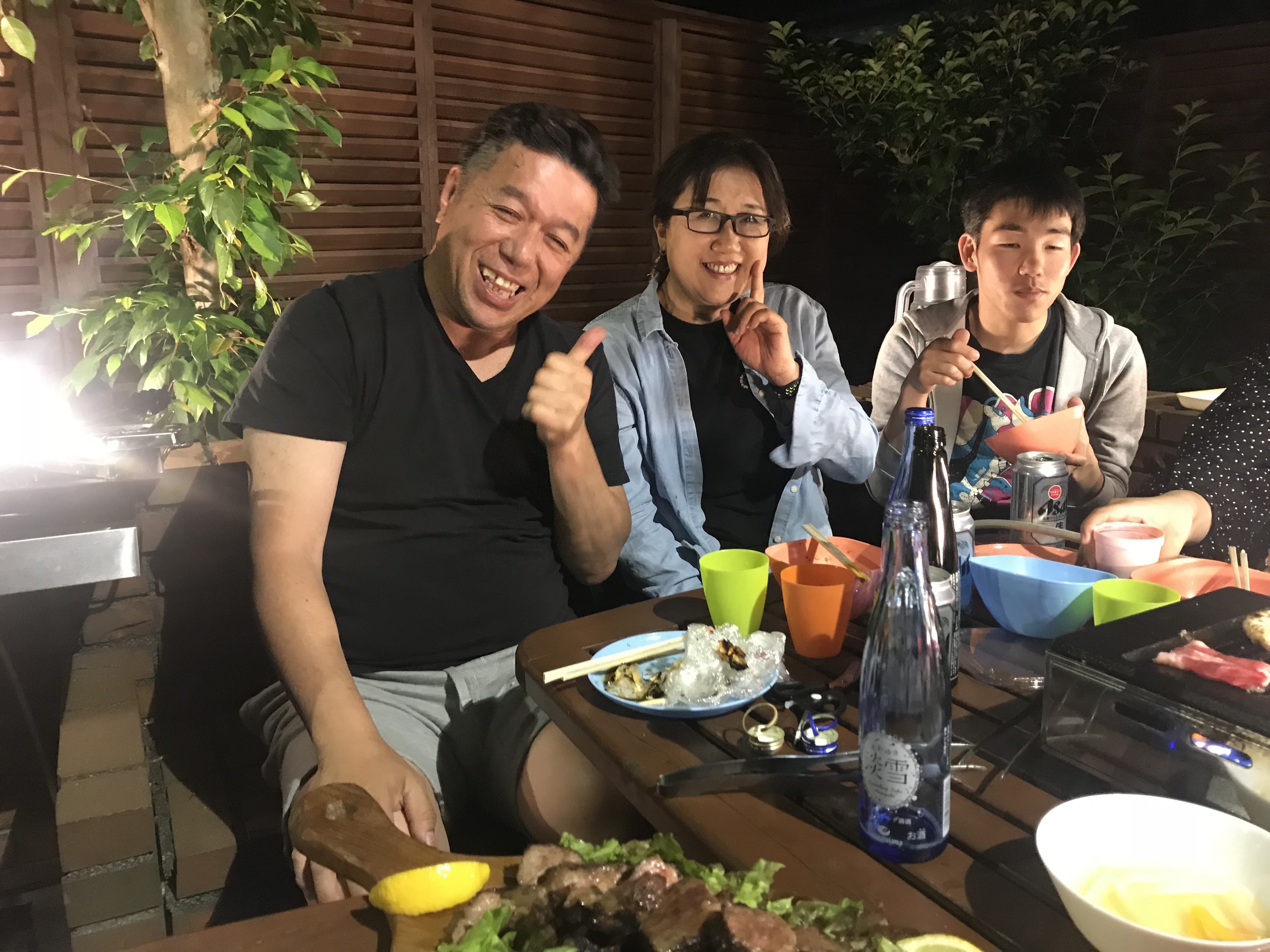
30 things not to do in Japan if you want to keep face.
*If you are the sort of person that can read while they listen then why not play our latest travel podcast episode! How to cope in Japan by knowing a few of the cultural facts!
The House Don’ts in Japan
#1: Don’t wear your shoes in the house
There are many Japanese culture facts that you should be aware of and this is a biggy.
Shoes are to be left outside the door.
Make sure when you visit Japan you bring your own house slippers.
These Japanese-style slippers are the ones we wore in Japan, and they were perfect (we also wore them on the plane once we had left Japan too.
* Have this tip on me: One of the many secret airport hacks every traveller needs to know!) always wear slip-on shoes on the plane!)
Don’t do what my teenage son did and try walking around in socks. Not acceptable. Get the slippers on.
Don’t wear the same house shoes in the bathroom.
If you are staying with a Japanese host or in an Airbnb, then you will notice that outside every Japanese bathroom, there is a pair of rubber sandals.
These are your bathroom shoes. Do not go into the bathroom in your house slippers!
*As a side note, Japan is very similar to New Zealand in this way. When people ask me, is Japan like New Zealand? I will often refer to this shoe tip.
No shoes in the house in New Zealand as well as in Japan!
#2: Don’t believe people when they say a futon is uncomfortable
After listening to the many horror stories of how spending the night on a futon is like sleeping on a board, I was expecting to come home from Japan with a broken back.
Not true.
I had some of the most comfortable night’s sleep I’ve ever had while we travelled around Japan.
The futons are soft, and usually, there is more than one, meaning that if you are like the princess and the pea, you can double up.
Would you love to travel more for a lot less? Then let me show you how! Join my FREE newsletter, and I will send you a complimentary copy of my ebook “Travel More, Travel Better, Pay Less”. I look forward to getting to know you better!
#3: Do NOT rule out Housesitting in Japan! (You’ll save a fortune!)
We are HUGE fans of housesitting. We do it whenever we travel.
If anyone ever tells you that you can travel for FREE by housesitting, they are absolutely right. Spot on. We have saved $$$ (approximately twenty grand – yes you read that right!) by housesitting throughout the world.
Japan is the perfect country in which to housesit because there are many ex-pats (mostly Americans and British) who live there.
When they take a vacation back home, they look for English-speaking sitters to take care of their property while they are away.
Honestly, I can’t understand why more people don’t do this!
How to housesit in Japan
We spent three days housesitting in Kyoto Japan in a very nice house (and with a beautiful little cat!). The owners were taking a business trip and needed someone to look after their place and cat and lucky for us they gave us the job.
So you can see why I’m so passionate about housesitting in Japan!
Housesitting is VERY straightforward: You join Housesitters, and you can use my exclusive discount code to save yourself 20% by Clicking here. you can view many beautiful places around the world (including Japan) that are available and waiting for travellers like YOU to take care of them.
If Housesitting seems like a good fit and you too would like to join us, and thousands of other savvy travellers who get to travel the world without paying for accommodation then sign up for a year’s membership (for less than the cost of a night’s accommodation in Japan) and you can use my exclusive discount code to save yourself 20% by Clicking here.
Available Houses for you to stay in (for FREE!) in Japan
You make a profile and then twice a day you are sent emails (such as the screenshot from my phone below) listing available properties in Japan.
As we all know, accommodation in Japan isn’t the cheapest in the world so if you want to travel to Japan on a budget then become a Housesitter!
I have enclosed a screenshot that I received this morning.
Click here to see all the current house sits in Japan.

This is one of the many emails you will receive weekly, telling you about the latest housesits in Japan!
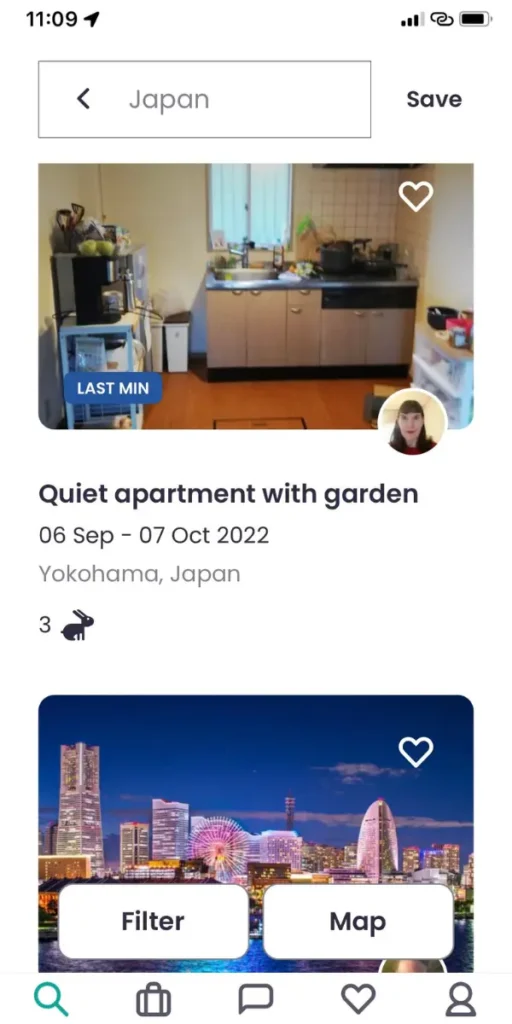
How easy would it be to look after three rabbits in return for a MONTH’S Free accommodation in Japan!
Housesitting is a fabulous way to experience living in beautiful parts of Japan in return for looking after someone’s property (and maybe a pet!)
Next, You Could read:
Japan’s BIGGEST Secret Ever. You Will Never Guess What It Is…
Japan Train Don’ts
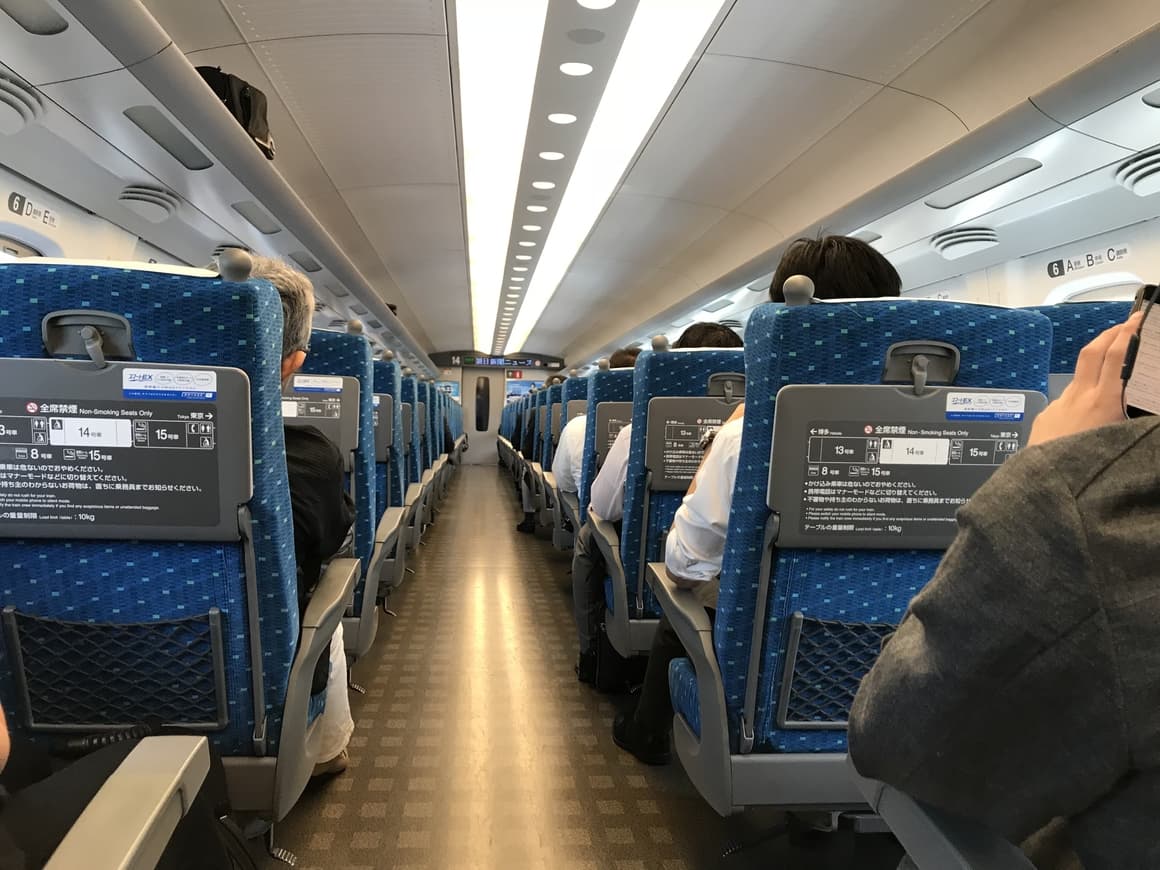
The train in Japan is an experience all in itself. read about three things you must not do before getting onto a train in Japan.
3: DON’T forget to buy a Japanese Rail Pass!
When we visited Japan, we were told that it was cheaper to by individual train tickets rather than use the Japanese Rail Pass.
So that’s what we did. And we lost money.
If you are visiting Japan and you have a planned itinerary that takes you all around the country (a must!) then buy your Japanese Rail Pass in advance.
It will not only save you a stack of money but (more importantly) it will save you the stress of having to line up and hope that trains have the availability that you need.
Riding the Shinkansen from Tokyo to Osaka is an experience you cannot miss in Japan!
How to buy a Japanese Rail Pass
There are a couple of other companies that sell JRP tickets but please. Do yourself a favour a buy them straight from the legit company.
Buying a Japanese Rail Pass is super easy.
- Order the Japanese Rail Pass here
- The company will send you an exchange order. This will be couriered to your chosen address (usually takes no more than 3-5 days).
- You must sign for it.
- You arrive in Japan with your exchange order.
- You find a JRP office (these are in all the major train stations in Japan and also in most airports!)
- Bring your passport. Fill in a form. Exchange the order form for the real deal rail pass
- Off you go! Super secure and easy!
If you have any more questions about taking the train in Japan then check out the Japanese Rail Pass Forum. It is a free resource and gives you invaluable advice about travelling in and around Japan by train.
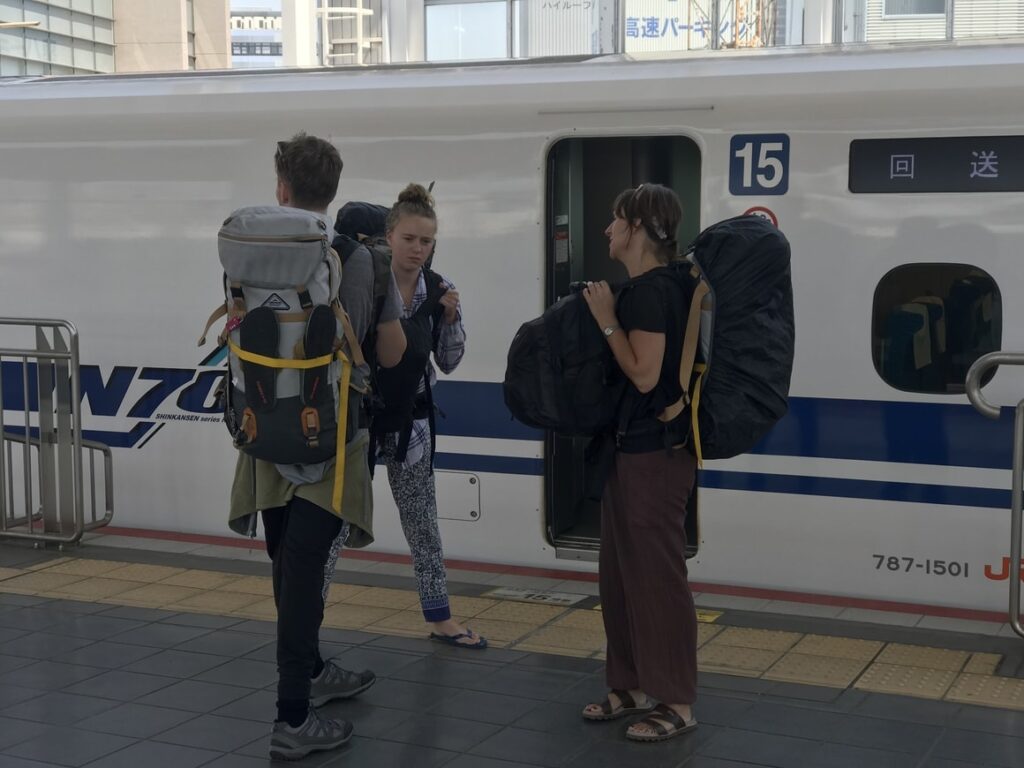
Not the best of photos but one of my daughters face eager to get rid of her heavy backpack and get onto the luxurious train! Do not miss the chance to travel by train in Japan.
4: Don’t worry about taking a snack with you for your long train journey
On every Shinkansen train (bullet train), there is a tray and cup holder provided with every seat.
Eating on long-distance trains in Japan is acceptable as long as you do it neatly and quietly and make sure to take every last scrap of litter with you.
5: Don’t use your mobile phone on the train
Travelling by train in Japan (or indeed any form of public transport) is quite perfect.
Nobody talks on their mobile phone, nor is there any music blasting from the person’s headphones sitting next to you, no. Text, by all means, but don’t talk loudly, in fact, don’t make a peep.
Just enjoy the scenery.
The Wifi Don’ts

Don’t come to Japan and expect the wifi to work everywhere you go. If you need to be constantly plugged in then rent a mobile router
6: Don’t come to Japan and expect to get wifi wherever you go.
Apparently, some cell towers in Japan work on different frequencies, meaning that not all phones (even the latest iPhones and Samsungs) will work with a local SIM.
If you can’t be without wifi, then there is an easy solution to this.
Hire a mobile wifi router. It is straightforward and convenient; depending on which company you use they will either deliver it to your hotel, or you can arrange to pick it up.
Simply Google ‘hiring a mobile wifi router in Japan’ and you’ll be given lots of options.
Activities Don’ts
7: Don’t miss the opportunity to make your own chopsticks.
If you are planning to travel around Japan, try and get to a chopstick factory. We spent a few hours with the kids planning, designing and polishing our own chopsticks, which we then got to take home as a souvenir.
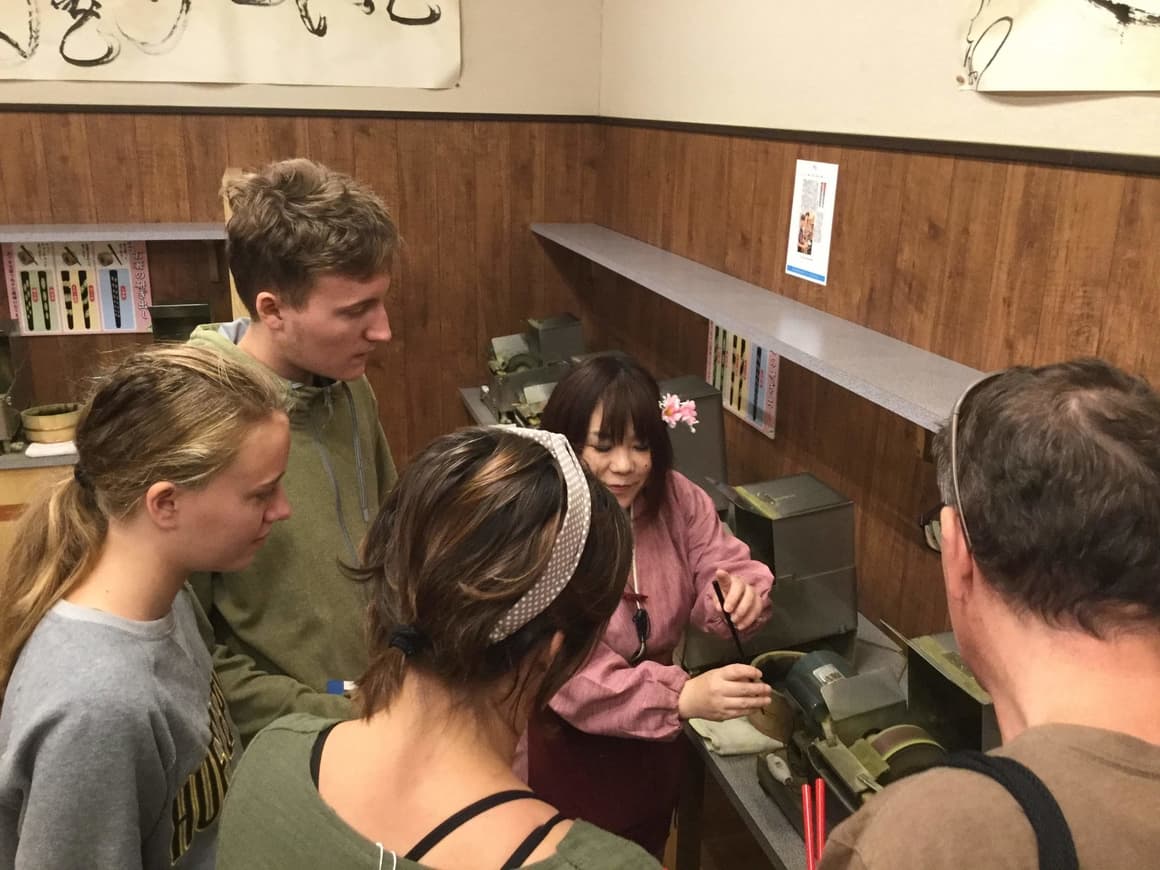
Don’t miss out on making your very own chopsticks in Japan
8: Don’t miss the chance to spend the day at a Japanese theme park.
If you are looking for things to do in Japan, love thrills and want to keep your budget looking healthy, then I can highly recommend the Nagashima Spa Land.
We visited this theme park in Japan, and it was superb value, pretty empty, and it had the best rollercoasters we have ever experienced.
Japanese theme parks have to be experienced to be believed, they are craaazzy!!

Don’t miss the chance to visit a Japanese theme park. This one that we went to was excellent value, and we experienced some of the scariest roller coasters ever!
9: Don’t forget to go to a Karaoke venue and have a good sing-song!
Japanese people love Karaoke. I think that is why the Japanese people are all so calm. Businesspeople take clients to Karaoke venues to relax them, and teenagers go there on a first date.
As an introverted Brit, this was hard or me to get my head around, but I am so glad I did.
You are provided with your room, served tea, coffee or alcohol and left to sing for a few hours I loved it, and you will too!
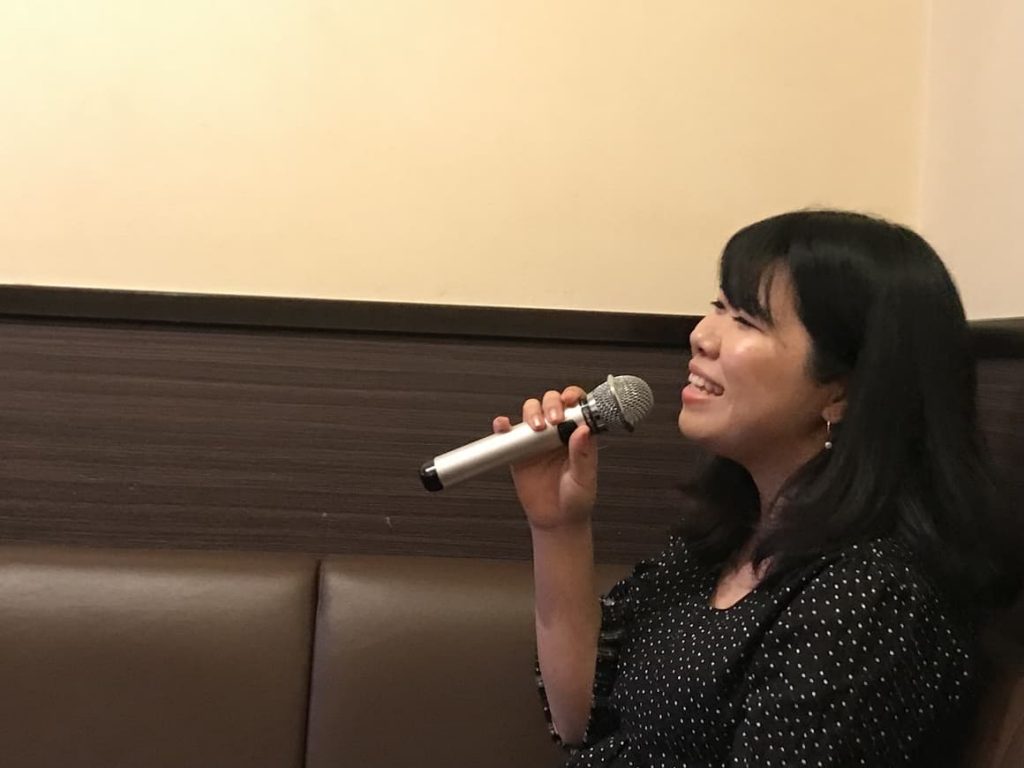
To the Japanese people karaoke is part of their life. What better way to relax and release endorphins than to have a good sing-song?!
Would you love to travel more for a lot less? Then let me show you how! Join my FREE newsletter, and I will send you a complimentary copy of my ebook “Travel More, Travel Better, Pay Less”. I look forward to getting to know you better!
The Eating Don’ts
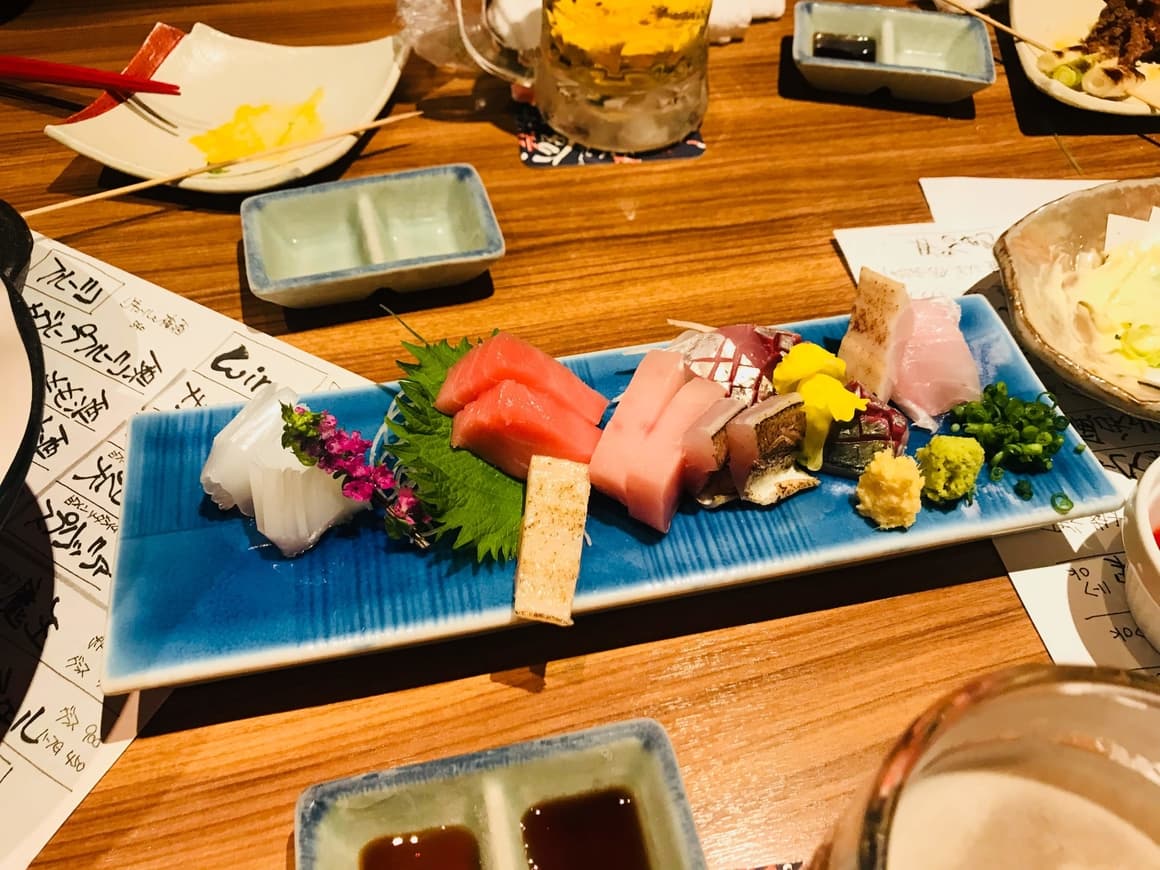
The food in Japan is exquisite but you would be forgiven for thinking that the portions are tiny…
10: Don’t freak out if you are taken for dinner by a Japanese host and the portions are tiny.
Unlike the Western society, where it is customary to pile your plate with food as high as you can in case there is a famine before bedtime, the Japanese eat a little, slowly and then order more.
We were taken out to a restaurant and the food just kept coming and coming. It was my teenage son’s dream come true. We later found out why…
11: Don’t finish everything on your plate; the host will assume they haven’t fed you enough.
Self-explanatory really. Unless you want your host to keep plying you with food, leave a small amount on the plate and in your glass to indicate that you are satisfied.
Hard for those travelling with a teenage boy, I know.
12: Don’t worry about slurping your noodles as loudly as you can
Slurping your noodles in Japan is not considered bad manners. Quite the opposite. Make sure you let everyone in the Ramen Bar know that you are enjoying the food by joining in with the slurping.

Don’t worry about slurping your noodles in Japan, it is acceptable!
13: Don’t play with your chopsticks
There is a certain etiquette when using Chopsticks in Japan, and there are many things you must not do.
Chopsticks do’s, and don’ts would need a post of its own, so I’ll give you the most important things you mustn’t do.
Don’t point with chopsticks, or leave your chopsticks to rest vertically in your food.
Do not stick your chopsticks upright into a bowl of rice. Do not use one chopstick at a time and don’t spear your food with a chopstick.
14: Don’t tip the waiter or pay the bill at the table
The waiter may very well leave the bill on the table, but don’t throw a wad of notes down and expect him or her to arrange payment, this is considered very rude in Japan. Always take your bill to the counter and pay after your meal.
If you are wondering do you tip in Japan? The answer is no.
15: Don’t pour your own wine
It is considered polite in Japan for you to pour your host’s wine but never your own. Let your host do this. And remember what I told you about leaving a small amount in the bottom of the glass.
Never down the dregs and wait for more. Just saying.
For Pinterest ⇓
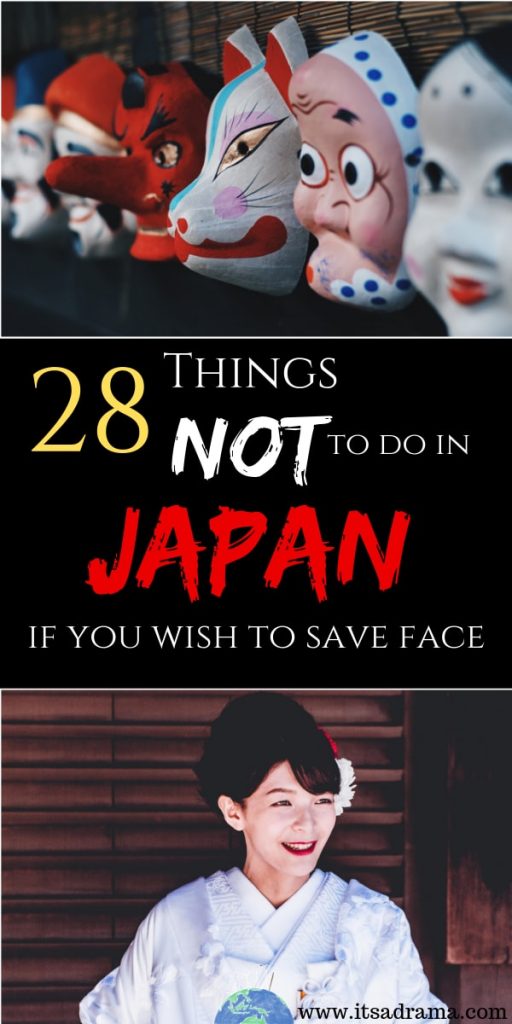
Related Posts That You Will Enjoy!
39 Japanese culture facts that you (really) need to know before you arrive
The perfect 2-week Japanese Itinerary
Backpacking in Japan. What they don’t tell you.
Couchsurfing. Will I be murdered and other FAQ
Things to do in Japan when you haven’t got buckets of cash
How regular people afford to travel the world with their kids
The Shopping Don’ts
16: Don’t mistake the 7 eleven’s for being the same as everywhere else In the world
The 7 elevens in Japan are like nothing you will have ever experienced before. They are amazing, and if you are travelling in Japan on a budget, they will soon become your best friend.
Freshly made sandwiches cut to perfection, cabinets with bottles of hot coffee and tea, small bottles of wine, cakes, ready meals (with a microwave provided) the list goes on.
17: Don’t disregard the 100 Yen shop for buying essentials
The 100 Yen shop is the equivalent to the Dollar shop back at home, but, as always, the Japanese tend to do things a lot better and more sophisticated than the rest of the world.
The best things to buy in Japan can be found at these little treasure troves.
Rather than find cheap, tacky plastic toys and silk flowers you will be met with an array of excellent quality, everyday Japanese essentials. Don’t let the name put you off, if you need anything, you will find it in the 100 Yen shop.
For Pinterest ⇓
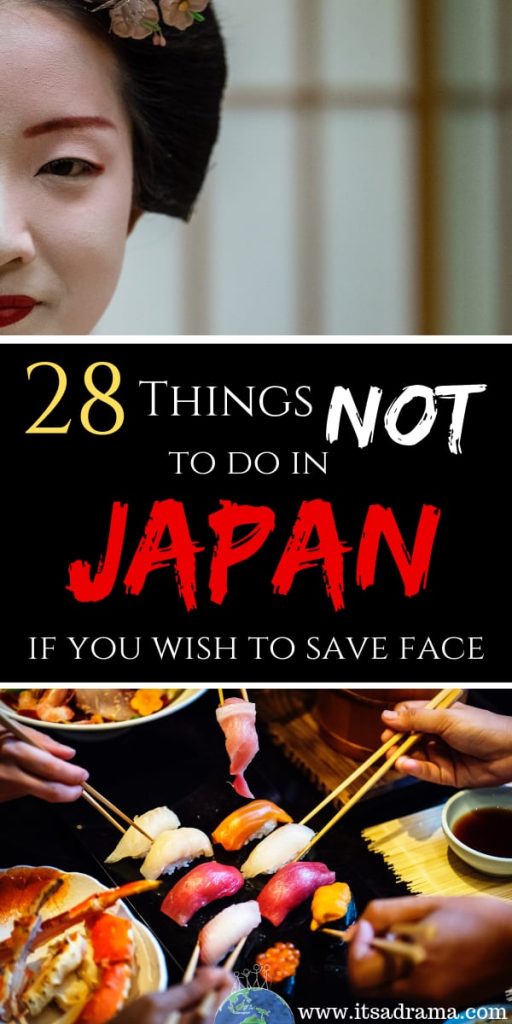
The Japanese Culture Don’ts
18: Don’t eat in the streets
The Japanese people do not eat ‘on the go’ and neither should you.
Instead, stand outside the many convenience stores or train station booths and eat your meal. Here you will also find garbage bins to dispose of your rubbish.
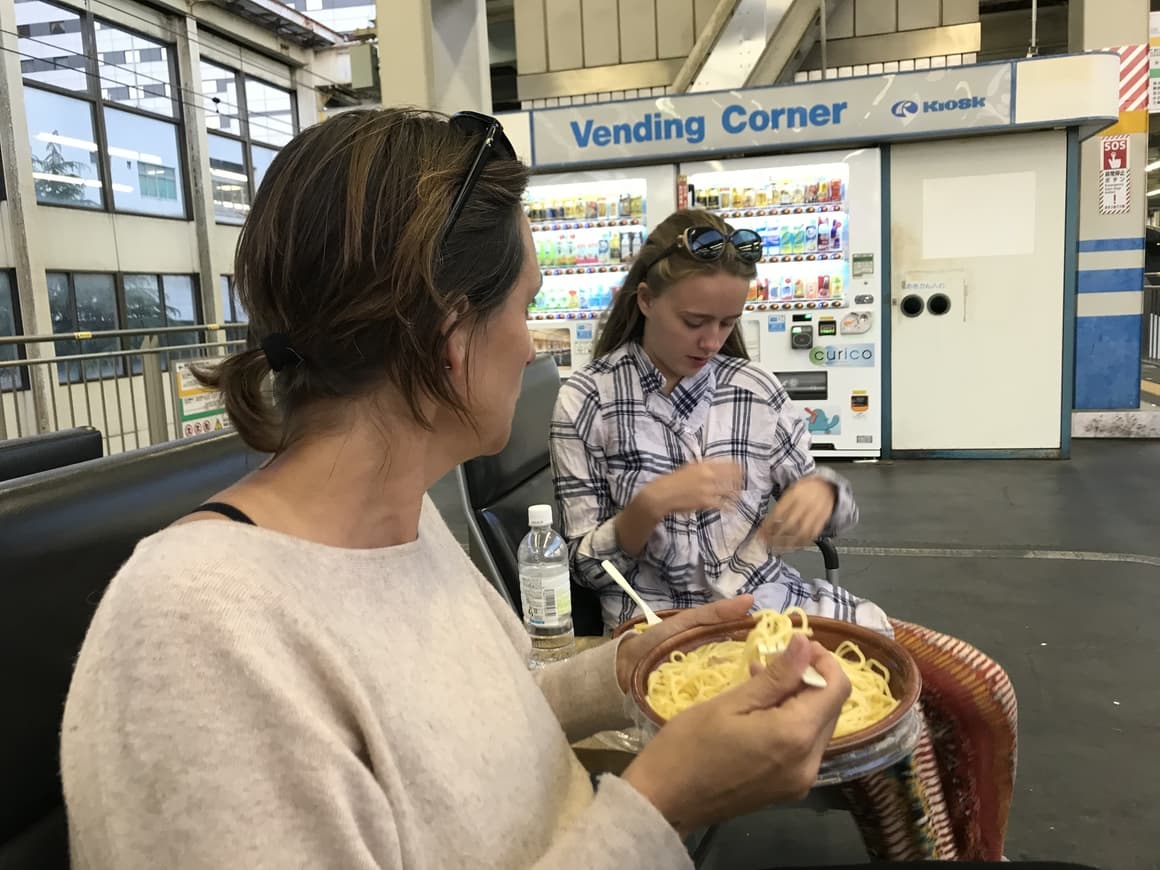
The Japanese people don’t eat on the go and neither should you! Instead, choose to eat outside the many food kiosks at the railway station
19: Don’t receive a gift with one hand
Always accept a gift from a Japanese person with two hands. receiving it with just one is considered rude.
20: Don’t make last-minute arrangements
Japanese people are planners. They arrange with each other weeks ahead to go out for the evening. Don’t make last-minute arrangements and expect your Japanese hosts to be happy about it; they don’t appreciate spontaneity.
Check Out Our Video That We Made Of Our Life in Japan!
21: Don’t be late
Similarly, don’t be late for anything. Life in Japan runs like clockwork, and you won’t be a popular person if the schedule is of course because you couldn’t find your wallet.
22: Don’t believe what everyone tells you about no one speaking English.
If you are worried about going to Japan without speaking Japanese, don’t worry. There are many things that ‘well-meaning strangers’ will tell you about life in Japan, most of which will usually turn out to be utter tosh.
While English isn’t spoken as widely as some countries, the Japanese people will try their hardest to help you out, and we found that in major train stations, airports and especially in Tokyo, most people could speak enough English to get by.
If you are really worried about speaking in English in Japan, then you could always try using Google translate.
23: Don’t cross the road unless the little Flashing man tells you to do so.
There are lots of rules in Japan, and one thing you must not do is break those rules.
You may find yourself standing at the side of a junction on the street in a town, with not a car to be seen for miles around, and still, nobody will cross the road until they are told to.
If you do make a quick run for it and hope nobody notices then you will be frowned upon. Go with the flow and don’t break the rules.
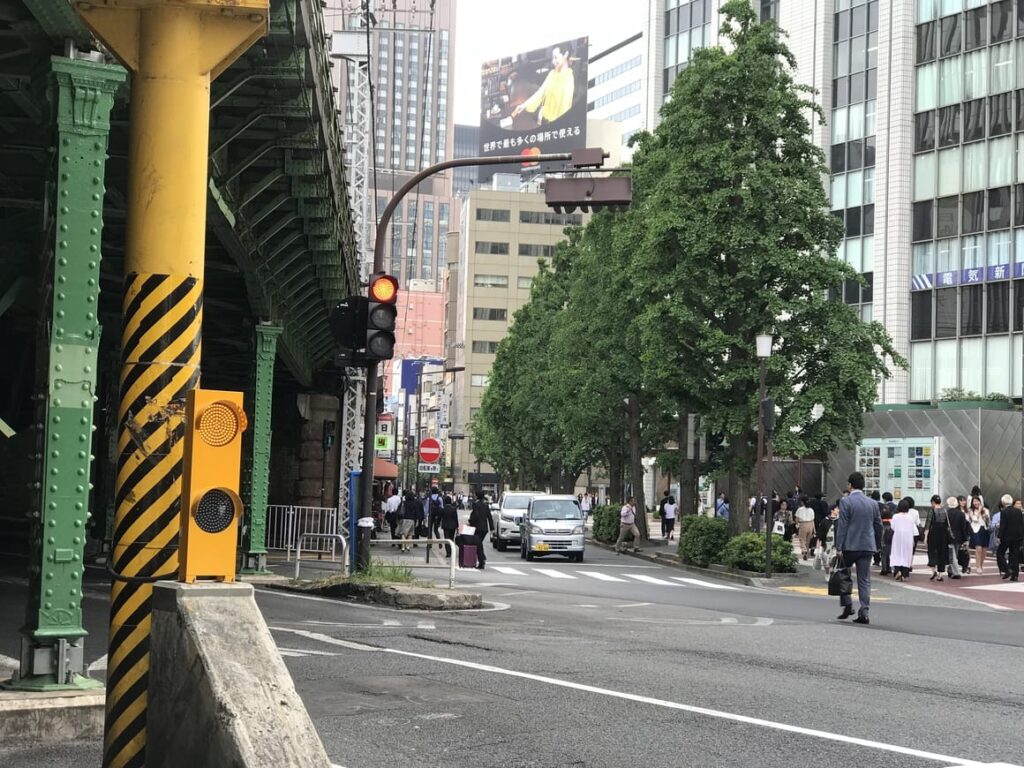
Do not cross the street until the little man is flashing. It is not good to break the rules in Japan – not unless you want to be a bit of a rebel…
24: Don’t try to push in when there is a long line
Japanese culture encompasses patience.
Remember this when you are queuing up for something.
The Japanese people will never push in front of a line. They will wait their turn, and because of this, things run a good deal smoother.
If you see a long line for something, fear not, it will be gone before you know it. Do not be tempted to push in.
25: Don’t expect the toilets to be like any other toilet in the world
I could write forever about my love for the Japanese toilet. seriously, they are divine. They have to be experienced to be believed.
The Japanese toilet will play music to you, warm your backside and then shower you in the softest of water at just the right temperature. Never mind Mt Fuji, where’s the nearest bathroom.
26: Don’t Blow your Nose In Public
Not the thing to do in Japan, sniffing is ok it seems, but if you need to blow then best to do it in private.
27: Don’t Be Spitting In The Park
This is a law in Japan so watch out! Spitting in the public park can land you with up to 30 days in jail or slapped with a 10,000 Yen fine. Either way, not very pleasant – the spitting, not the fine. Don’t do it!
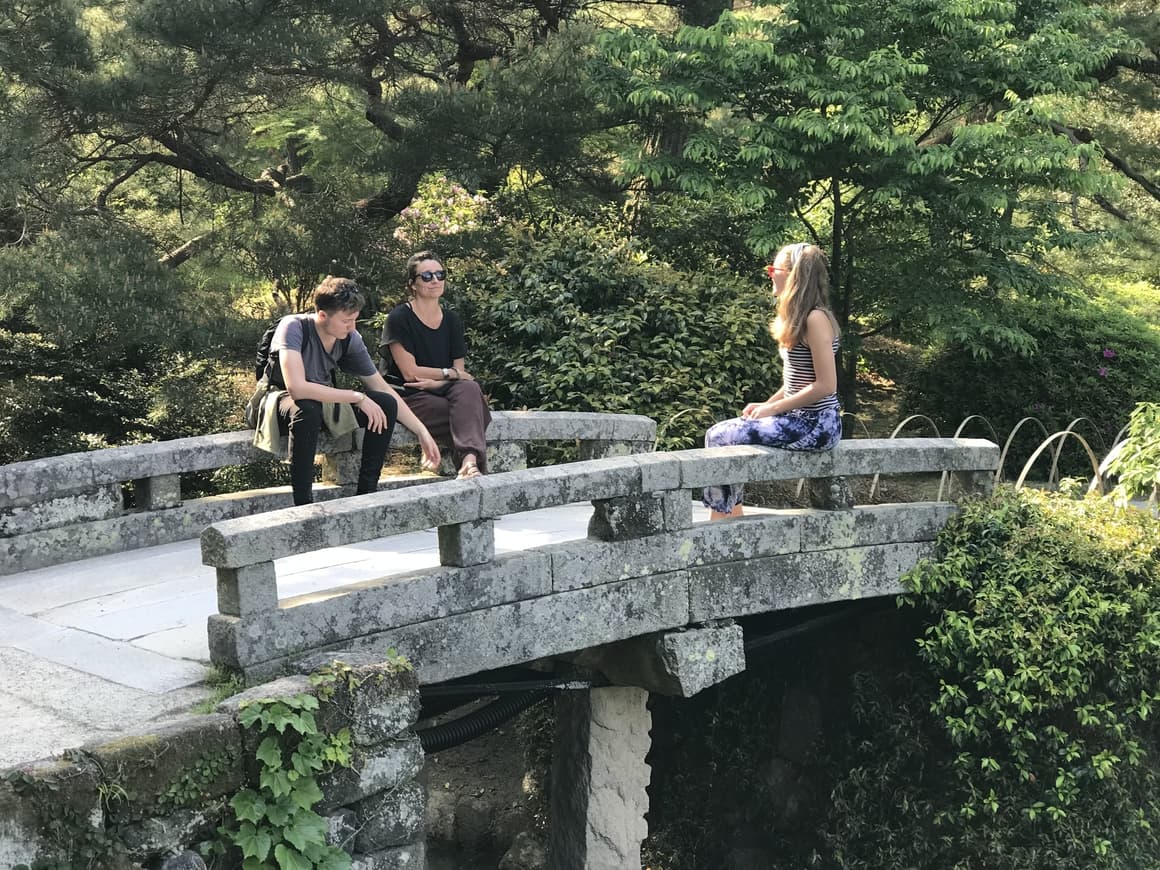
By all means, enjoy a day at the park but don’t think about spitting. This will bring about a fine or even worse – imprisonment!
28: Don’t come to Japan expecting everything to be high tech, bright neon crazy, crazy, crazy.
If you are in Tokyo then yes, there will be lots of neon signs and the feel of the place is very modern, futuristic almost, but out in the country, it is quite the opposite.
You can visit lots of towns in Japan – including the pretty mountainside village of Yoshino, and you will quite literally feel as though you have stepped back in time.
It is wonderful.
Japan is full of ancient temples, wooded hillsides and people who have time to stop and talk to you.
Would you love to travel more for a lot less? Then let me show you how! Join my FREE newsletter, and I will send you a complimentary copy of my ebook “Travel More, Travel Better, Pay Less”. I look forward to getting to know you better!
Here’s a video of us walking the streets of Tokyo to give you an idea of the neon lights:
29: Don’t forget your travel insurance!
The Japanese health care system is one of the best in the world and the crime rate is reasonably low; even so, do NOT think about visiting Japan without travel insurance.
Make sure that you have excellent Japan travel insurance.
We recently travelled the world and as you can imagine, my husband did his research thoroughly. You won’t find better travel insurance than this one.
Whichever company you choose to use make sure that you are covered for delays with baggage on arrival, medical and dental costs and car hire excess.
30:
NOW!! Why not listen to our latest travel podcast episode where I discuss with my teenage son the culture facts of Japan and how they took us by surprise (literally)! Click below to play!
Related posts that you will enjoy!
Arrive In Japan Feeling Gorgeous. 10 Plane Essentials That You Will Never Leave Home Without Again!
How We Saved Ten Grand by Housesitting in Europe
The Ultimate Travel Checklist. 25 Things You Will Probably Forget
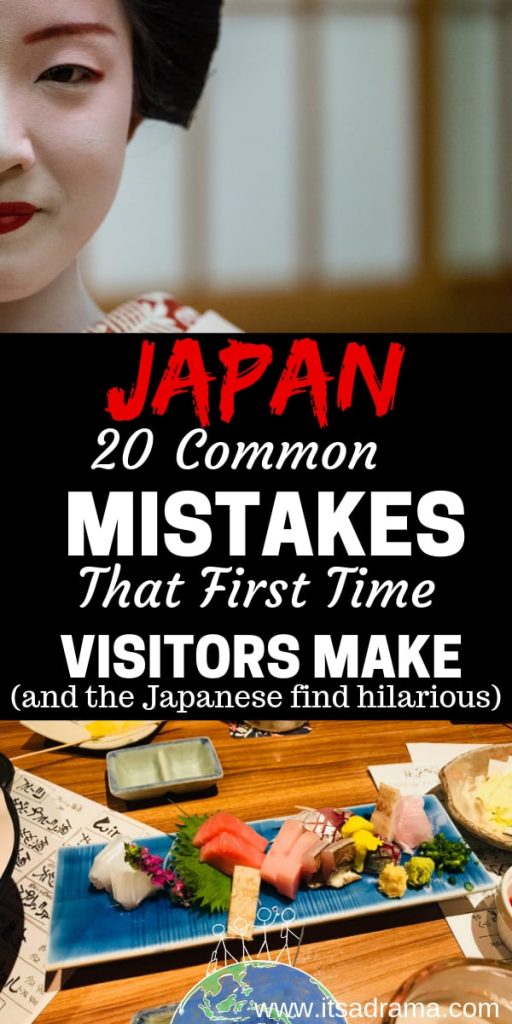
Remember, to make your life easier when booking trains, buses or taxis in Japan, do not hesitate to use 12GoAsia. Yes, I am an affiliate for them but that’s because they saved my bacon so many times while we were in Asia – they are brilliant.
Of all the countries we visited in the world (we went to 32 in total), Japan was right up there as being one of our favourite places – ever.
Japan is clean calm, has amazing food, lovely people, and gorgeous scenery. It is on my list of the worlds most unique destinations.
As long as you remember your manners and follow the list of things not to do in Japan you will love it!
If you can think of any others and would like me to add them to the list, please feel free to leave a comment below, and please remember: PLEASE share this post with someone who would enjoy it!

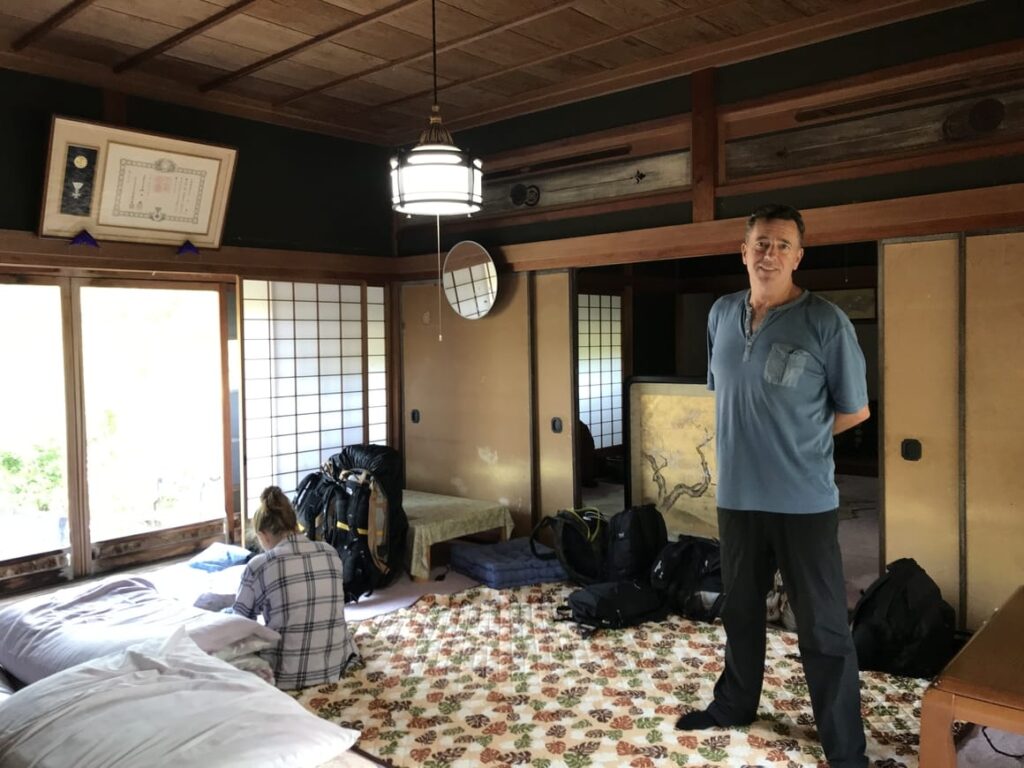

Very helpful, gives a great insight into everyday living.
Glad you enjoyed it Lindy!
I’ve lived in Japan for 17+ years and such ‘don’t do these things in Japan’ blogs like this just make visitors nervous and puts them on edge rather than allowing them to relax and enjoy their vacations here.
Thanks for letting people know it’s okay to eat on trains here….Google ‘ekiben’ and you’ll see doing so is practically part of the culture. ‘Eat neatly and quietly on trains’. Why ‘quietly’? And for that matter why ‘not make a peep’ on trains in Japan. You’ll have to explain both to the locals as they’d be very confused by your advice.
People do talk on mobile phones on trains, though I admit rarely and it is frowned upon, but when they do they cover their mouth with their free hand and keep it very short so why write ‘*no one* talks on the phone’?
‘The Japanese people do not eat ‘on the go’ and neither should you’. Oops! I’m gonna have to chase down the guy I saw earlier today doing this (and all the others locals that eat on trains) and show them your blog so they don’t make that mistake again!
Most people in Japan do not speak English. Let me clarify they studied English to high school level but *most* do not *speak* it. Their output is generally considerably low as is their comprehension. Please don’t encourage a reader to visit Japan and have them put a local in a very awkward situation by attempting to converse (even at a very simple level) with them. It’s just unkind to do so and particularly so in Japan because they don’t appreciate being ‘shown up’ like this.
A lot of what you wrote is good advice (e.g. ¥100 stores/futons being great/crossing roads, etc. ) but a lot of what you wrote is just plain incorrect.
Please don’t just visit a country and write incorrect information for the sake of maintaining a following on a blog and thereby misinforming others. Thanks and feel free to email if you’d like any clarification.
Dear not relevant.
Wow. What a comment. I only wish that I could say I had lived in such a beautiful country for 17 years – by doing so I would have a lot more in-depth (and precise) information to share with my readers.
As it was, my children and I couchsurfed with local Japanese families for a month and as is my obligation to the people who read my travel blog I relayed back EXACTLY how I saw the country.
Thank you for your comment not relevant. I am always grateful for any information that helps my readers. Have a lovely day.
Liz
I would die to go to Japan I would give you my left arm.
I loved this! I laughed at the futon part. I stayed in a Ryokan and I found it the most comfortable experience ever. After returning from travelling I wanted to have a futon in my room and tatanami mats.
I never got to make my own chopsticks and did not know about this either! I’m returning next month so will definitely do then. Yes, I agree on the toilets being out of this world also. I was mesmerised by all the different functions. I spent a good amount of time more than usual pressing them.
I finally talked my husband into going to Japan. He is very reluctant on going. I want to go to celebrate our daughter’s 30 birthday. Any ideas? Especially easing my husbands nerves? Thank you
Well, you’ve done the hard work and convinced him to go! I was going to ask you why he was reluctant to go but then I remembered how I felt about Japan before I visited. It was my son’s dream to go there but to be honest with you i thought it was just going to be a freaky expensive, rigid, technology-filled, neon, youngsters, billboard place. (sorry, that’s the only way i can describe what i imagined!) I had a million other places I would have much rather seen than Japan so I get your husband
BUT
It isn’t ANYTHING like that!! Tell your husband that it is clean, safe, beautiful, kind, exciting, historical and by the way, the food is amazing (even if you don’t like noodles?!)
If after all that he is STILL nervous, send me my airfare and I’ll come and hold your hand?! XX
“tatanami” I don’t get it. Do you mean “tatami”?
Going to Japan is my dream! I probably can’t go this year but I am really hoping for next year. This post is so great, I will likely refer back to it!
Thank you Kelsey, I’m glad you enjoyed it and try your hardest to go to Japan!
Great tips! I’ve lived in Japan for 25 years. Two points, I do question….leaving food on your plate and a little drink in your glass….I was taught this is impolite as it implies you don’t really love the food and drink. When you’ve had enough, just hold up your hand to politely refuse anymore.
The 2nd point is paying the bill. You are correct…never throw bills on the table, but in many places, you do pay at the table by putting the cash inside the little folder provided with the bill and then motioning for the waiter to retrieve it. In many places, you do pay at the counter, but cash is to be placed in the little tray on the counter. You do not hand cash directly to the cashier.
Isn’t Japan wonderful? I LOVE living here! The Washlet toilets are soooooo nice. All of my houses have them. I can not live without the Washlet!
Thanks so much Judy! I never knew that about leaving a small amount on your plate – that explains why our wonderful hosts kept plying us with more food!! (my son’s idea of heaven!)
And now that you mention it, I’d forgotten about the not touching money part too. We went into the 100 yen shop and stood there with the money in our hand waiting for the cashier to take it, he kept looking down at the little grey tray on the counter and it still didn’t click with us…in the end the poor man gave up and took our money – it wasn’t until we watched other people in the line before us did it finaly dawn on us! I’ll be adding this to the list of things so thanks again, Liz
There’s a few other cultureshocks that I know about when it comes to Japan as I would like to know more about them in detail.
The first one is that death is considered a sensitive topic in Japan and the number 4 is not placed beside a hospital door as it is considered bad luck and sounds just like the word death in fact.
Another thing that is deeply frowned upon in Japanese society is the famouse gangster group known as the Yakuza and I don’t even know if you have to worry about them in today’s times even if Japan is considered a safe country.
Also could you warn what travelers are expected to see on Japanese TV, when it comes to there gaming shows, Anime, live action movies, and commercials as Japanese TV shows can get into some pretty akward experiences such as over the top bloody violent action scenes, explicit nudity, and that also includes adult content in perverted ways which aren’t considered right in the real world and that also sometimes includes Athiest views on religion in Anime so that the traveler knows what to expect before deciding to flip the channel when wanting to view something else on TV that he or she may find suitable for him or herself to view.
Next could you also bring up how to prepare yourself in a major earthquake as I could see this one crucially important not just only for the Japanese but also for the traveler in mind so that there prepared just incase a big one hits Japan once again.
You should also warn the traveler about the dangers of fugu or poisonus blowfish.
If a chef does not prepare the fish properly the person can sufficate withen four to six hours due to breathing issues and can die.
How to show respect and pray at a Japanese temple when first getting to Japan.
Why do some Japanese people dress and disguise themselves as vending machines?
Others for learning and being inspired when traveling to Japan.
Museums that focus on the Samurai and Shinobi.
(Ninja)
Museum on Budahism.
Meseum on Japanese bullet trains and Maglev.
Museum on Nintendo’s past history.
Museum on Japanese film history from past to present including Anime.
Note) If there are other musems that you’ve seen in Japan that you would like to recommend to travelers to check out while learning more up on the country go for it!
Thanks or arigato for reading and listening of what I had to say.
Sayanara.
Thank you so much for this super helpful information Sean. I was totally oblivious to the number 4 being associated with bad luck or the other things that you mention. I very much appreciate you taking the time to share this information with my readers; I am sure they (as do I) appreciate it. Thank you again.
It’s Sayōnara, not sayanara.
I will be going to Japan for 8 days in July with my daughter and a guest. We will be staying in Tokyo and plan on visiting Osaka for 2-3 days. There is no need for a JR Pass, correct?
If you are staying in only those two cities then no, you won’t benefit from the rail pass ( I would book my tickets in advance though for the days that you want to travel to Osaka. Have fun!
Which factory did you go to for chopstick making, and what city? I’ve found some classes but I haven’t found a factory.
Hello Linde
I can’t remember the name of the factory bit I have found the address on my phone for you. It is:
1-3 Miyanomae, Obama-Shi, Fukui, Japan.
Hope you enjoy it as much as we did!
Liz
I have never been to Japan but I have wanted to go since I was young I’m only 12 but how expensive do you think it would be to go to Japan for a year and should I start saving money now if I want to go when I am 25 or should I wait a bit then start saving
Thanks
Hi Dean,
Thanks so much for your comment – you remind me of my son Sonny who is now 19 🙂 It was because of Sonny that our family went to Japan. Like you, from an early age, Sonny was obsessed with the culture and the people of Japan. He read the book series ‘The Young Samurai’ by Chris Bradford and was hooked!
When he finally visited Japan he said that it was everything (and more) that he had ever dreamed of. I know you are going to love Japan and I think it is fantastic that you are planning for your trip now.
My advice to you would be to start saving your money and do lots of research about Japan and then when the time comes for you to go you will have lots of information on where you want to go and what you want to see.
Good luck Dean and let me know if you need any more tips 🙂 Liz
my research has been great so far I am doing a 135-page report on japan on word online do you think that that is enough or should I do more? now i have started saving up my money now so far I have a bit under 50 dollars. thanks for the advise
also if you go again i found a site that is
25 things you absolutely must see and one of them is at the Zao Fox Village in northern japan i saw that on the site and figured you might like it
thanks for the reply i have started saving up and have saved about 50 dollars.
and I am doing a 135 page report on word about japan do you think that is long enough?
and I found a site saying in northern japan there is a zoo called the Zao Fox Village have you been there? and did you guys ever go to a kaitenzushi restaurants because there is a sushi conveyer belt. i like sushi do you?
thanks for the tips
🙂 Dean
how much money do you think it would cost to go to japan?
thanks liz i have honestly been wondering if you were to go back to japan what would you do that you didn’t do before
Thanks, Liz I figure I would let you know what I am up to so I have started saving as you suggested and the money I got from Christmas is about 50 dollars so I am saving that do you think if I save 50 dollars a year that would be enough or no?
also, I have been writing a 135-page report on japan on word do you think that is long enough.
also when you went there did you go to and sushi restaurants because my so far research has said that there a conveyer belt with sushi? I like sushi what about you?
I am also learning the 47 different prefectures.
thanks for the advice to start saving and to start researching
war regarded
-Dean:)
Sorry about all the comments they just wouldn’t post so I posted more cause they won’t show up until 24 hours after your last post
Hi Dean, That’s ok. Actually how it works is that I have to manually approve any comments on my blog before they get published. That way, if a blogger gets spam (or people not being very nice) the owner of the blog can delete the comment.
I check my comments twice a day, once in the morning and again before dinner and so that is why your comments won’t show up immediately. 😊
Ok, to your questions…
1: The 135 report on Japan sounds fantastic. You are going to know a LOT about Japan when you make your trip and that will make the experience all the more enjoyable.
There is nothing worse than visiting a country which you know nothing about. I did this when I visited Hong Kong and I wasted so much valuable time sitting in my hotel room, quickly trying to Google what to do the next day. I should have done that before I arrived so that I could spend every minute enjoying and exploring the country. So yes, I think the research you are doing is perfect!
And who knows, with all of this knowledge that you are gaining about Japan when you do get to visit the country you will become an expert. Then, in your spare time, you could write a book or start a travel blog for other teenagers who want to visit Japan but don’t know where to start and make money to pay for more trips to Japan (or the rest of the world!).
2: Yes there is sushi in Jpan and yes, in some restaurants it comes out on a conveyor belt which is so cool!
We were taken to a restaurant like this by a Japanese couchsurfing host that we were staying with.
You would choose whatever you wanted from the conveyor belt that passed your table (you sit around in a big oval shape and the conveyor belt is in the middle) eat it, and then if you are still hungry you take another off the belt. I had to keep my eye on Sonny – he can be quite greedy!
When we had finished eating the person that was serving us came to our table. He counted how many empty plates we had and then gave us our bill.
Japan also has lots of other food other than sushi and my favourite is Ramen (because you get to slurp it really loudly and noone thinks you’re being rude!!).
3: When we go back to Japan (which I hope to do in 2022) I will go in the cherry blossom season. We arrived in Japan in late spring and had missed it. I would love to see the trees in full blossom.
4: I am not a fan of zoos but thank you for the tip!
5: How much would you need for Japan? Well. There are lots of ways to save money while in Japan such as staying in hostels, taking the bus instead of the train, visiting the supermarkets after 8 pm when lots of delicious food is reduced and only eating at local low-cost places (always head to where the students are in a city and you will find cheap places to eat.)
We were a family of four and our average cost in Japan was $80 a day. BUT. We couchsurfed for a good deal of our trip in Japan meaning that we didn’t pay for accommodation. That cost also didn’t include the train fares.
The biggest expense in Japan is accommodation. That is why it might be worth exploring the option of couchsurfing for you when you visit Japan in your twenties (you have to be at least 18 to couchsurf).
There are lots of wonderful, kind Japanese couchsurfing hosts (lots of families too) that will let you stay with them for a night or two which means you can meet local people, learn and share information with each other about the different cultures AND save some money.
Here is a post that I wrote about what it is like to couchsurf. Remember though, you have to be 18 to become a couchsurfer. Speak to your parents and discuss if this is something that you could consider for when you are older.
Maybe you could go to Japan with your parents and experience couchsurfing as a family? We did that and it was a lot of fun.
https://itsadrama.com/couchsurfing-review/
In the meantime, I think it would be a great idea for you to find a Japanese penpal and learn more about the country that way. Ask your parents or a teacher how to get in touch with penpals, I’m sure they’d be happy to help you.
I hope this helps and remember to keep documenting your research and your plans, and perhaps you can write a book or start a blog that will help others who are like you!
Liz 🙂
I love the part at the beginning where Sonny kept saying “a crazy person” it gave me a laugh.
Writing a book sound like a great idea. Do you think I should write it in English or in all languages? And if I do it in all languages should I do a big book or a bunch.
I also love the part where Sonny says “he wants to know so he can make a skin suit for a horror movie” “His hair was sticking out 2 meters to the side” ” his great chest hair” lol
The hole sounds soooo scary i would of said no thank you.
I love the part where Sonny sais” no I wouldn’t go back” and then you said “really” and he said ” maybe with a camera crew” i was basically laughing the entire time.
Glad you enjoyed it! I will forward the message to Sonny! Have a great day Dean!
when you are in Japan always finish your plate japanese hate to waste food
11: Don’t finish everything on your plate; the host will assume that they haven’t fed you enough.
i’m japanese and this is TOTALLY WRONG. Finishiing everything on your plate is the mucu better. When you dont eay all og them, the host will assume ” the plates are nor good/ delicious?” Better to fix it.